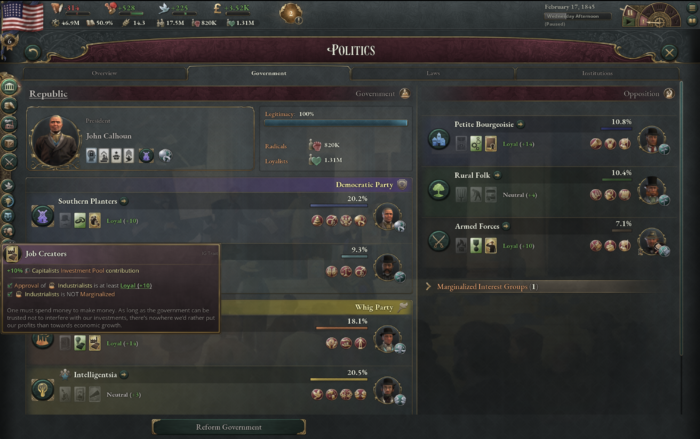The government type in Victoria 3 depends on several key factors such as the governance principles, distribution of power laws, the ruler’s title, and transfer of power laws. Combining these factors leads to a wide range of possible government types and political systems.
Hereditary
An heir inherits the throne after the death of a ruler. Stability is maintained through dynastic succession, but incompetent heirs are difficult to remove.
Dictatorial
After the death of a previous ruler, the new leader of the interest group with the most influence becomes the new ruler. Power is concentrated with the dominant factions but incentives meritocratic succession.
Presidential Elective
After the end of a ruler’s term, elections are held in which the leader of the interest group with the most influence wins. Regular popular validation, but incentives demagoguery and pandering.
Parliamentary Elective
The head of government – chosen by the party with the most influence after the elections – becomes the new ruler after the government changes. It requires coalition building and compromise, but allows for more frequent renewal.

Governance principles
The governance principles form the foundational ideals and authority structure of a nation. Governance principles include:
- Monarchy – Ruled by aristocratic dynasty with executive power in the hands of a monarch. Provides authority and landowner strength.
- Republics – Power in the hands of elected officials and people. Moderate authority and ideology penalties.
- Theocracy – A government of religious clergies based on Scripture Gives authority and devout group strength.
- Council Republic – Ruled by workers’ councils. It favors trade unions.
- Chiefdom – Hierarchical rule in hands of kinship groups and elders. Limited centralized control.
Distribution of power laws
These laws determine who has the right to vote and political power:
- Autocracy – Absolute rule by the head of state without any accountability. it favors aristocrats and officers.
- Oligarchy – A government of a small elite group. It favors aristocrats and capitalists.
- Landed Voting – Only landowners vote. It favors aristocrats and clergy.
- Wealth Voting – Wealthy citizens get more votes. It favors capitalists.
- Census Suffrage – Literate men of certain status can vote. It favors intelligentsia.
- Universal Suffrage – All adult men can vote. It favors trade unions.
Ruler’s title and transfer of power
- The ruler’s title – monarch, president etc. – stems from the governance principles.
- How new rulers take power depends on laws like hereditary succession or elections.
Great combos to try
Autocracy with Landed Voting
An autocratic governance principle concentrates absolute power in the hands of the head of state without accountability. The link with the land vore limits the right to vote to landowners. The aristocrats and large landowners would benefit greatly from this combination, consolidating economic and political control. However, industrialists, intelligentsia, clergy, and trade unions would strongly oppose their exclusion from government and access to the vote. An autocrat would wield unchecked power, but would lack meaningful contributions to society.
Parliamentary Republic with Census Voting
A parliamentary republic run by elected representatives could implement census voting, granting suffrage only to literate citizens who meet certain status requirements. The intelligentsia would approve a census in which voting would be based on literate and educated citizens. Trade unions may accept limiting voting to maintain order. However, the aristocrats, clergy, capitalists, and landowners would oppose a census suffrage to limit their influence. This combination favors the intelligentsia but lacks the support of traditional power structures.
Council Republic with Universal Suffrage
In a council republic, workers directly elect their representatives to local and regional councils. In conjunction with universal suffrage, the right to vote is extended to all adult men. The trade unions would strongly support both the council republic governance and universal voting rights. The intelligentsia also approves of expanded suffrage. However, the aristocrats, clergy, capitalists, industrialists, and landowners would oppose the decentralized council system and mass democracy. With their support, council rule and universal suffrage cannot prosper.
Unusual combos to try
Theocratic Oligarchy
Combining theocratic governance with oligarchic power structures creates a system where a religious oligarchy rules, unchecked by outsiders. Pious and aristocrat interest groups may approve, but all other groups would oppose this consolidation of wealth and spiritual authority. Achieving this would require careful suppression of dissenting groups while appeasing the oligarchs and clergy. However, the value of roles could be enormous for a righteous or extremist theocracy.
Technocratic Council Republic
Bringing the efficiency of technocratic governance into a council republic system could create a hyper-rational workers’ state run by technical elites. The engineers and academics may approve, but industrialists and intelligentsia will oppose this collectivist technocracy. Technical skills could greatly improve the planned economy, but political tensions are high.
Imperial Dictatorship
An imperial monarchy or theocracy, which turns into a dictatorship after the death of the current god-ruler, concentrates absolute power for roleplaying value. Aristocrats may approve of the monarchy, while officers support the dictatorship, but all other groups oppose it. Recreating the fear and awe of the ancient god-kings requires silencing dissent and controlling the military.
In summary, players can mix and match governance ideals, electoral laws and power transition methods to create a wide variety of government types and pursue different goals. There is no single “best” approach, which gives great scope for political experimentation and replayability. By utilizing the flexible systems in Victoria 3, players can create unique political paths and alternate histories for their nation.